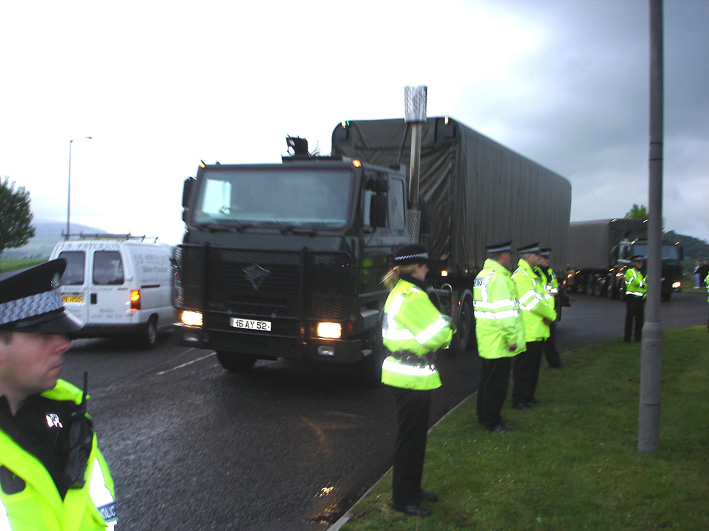Nuclear Warhead Convoy Secretly Passes Through Chilwell, Nottingham
imc-notts features | 11.05.2007 09:21 | Faslane | Anti-militarism
It has come to light that in the early hours of Thursday 10th May a convoy carrying nuclear warheads secretly passed through the Stapleford and Chilwell area of Nottingham. The vehicles were spotted driving into the Chetwynd Barracks in Chilwell at 6.30am for a rest stop. Heading for the Royal Naval Armament Depot (RNAD) in Coulport, Scotland, the convoy was spotted along the M1 and also the next day as it continued its route along the east coast and along the Edinburgh Bypass. According to a spokesperson for Nukewatch UK, who keep an eye on nuclear convoys around the UK, the route hasn't been used since the early 90's. She also mentioned that no convoys have been spotted entering the Chetwynd Barracks and it might be an indication of the convoys starting to use the Chetwynd Barracks for rest stops.
The convoy passed through dense populated areas in Stapleford and Chilwell before and after its rest stop at the army base on Chetwynd Road, Chilwell. According to campaigners each lorry weighs approx 44 tonnes and can carry up to 2 ready assembled nuclear warheads, which can contain up to 8 kg of plutonium and uranium each. Each of the modern warheads has the capacity of creating 8 times the impact of that of the bombs used in the attacks on Hiroshima and Nagasaki by America in 1945. The convoy was spotted leaving Burfield Atomic Weapons Establishment, 50 miles North of London around 12.30am on Thhursday morning. At Burfield AWE the warheads and explosives get assembled into working nuclear weapons. There were people stationed along the route from Stirling to Coulport attempting to resist the convoy. Read report.
Links: Map of location Chetwynd Barracks | Nukewatch UK | Nottingham CND |Nuclear Warhead Convoy Routes | Video: UK nuclear warhead's on the move, November 2006 | Nuclear Warhead Convoy on the road today (report from Edinburgh)

Nuclear transport on the Edinburgh bypass
What is a nuclear weapon convoy?
A nuclear weapon convoy is a cluster of vehicles travelling by road in convoy formation. It can be: * Carrying Trident nuclear warheads * Travelling empty to collect or having unloaded nuclear warheads * Engaged in an exercise simulating the transport of warheads * En route to or from an accident & emergency exercise on a military base.
The convoy comprises TCHD (Truck Cargo Heavy Duty) load carriers, Ministry of Defence Police escort vehicles, military support vehicles to deal with accidents or breakdowns and three minibuses of Royal Marines, often spread out over a couple of miles travelling at up to 55mph. Once seen, a nuclear weapons convoy is easily recognisable and unlike anything else on the roads. There is a multiplicity of escort vehicles, and the carriers are 44 tons, seven axle, articulated dark green trucks. Apart from the Marines’ vehicles, the convoy is garaged and maintained at Aldermaston. The Trident warheads are carried in large crates inside the green trucks. They are fully assembled and complete. The core of the warhead is a ball of plutonium and uranium. This is surrounded by specially developed conventional high explosives which would be ignited to create the critical mass necessary for a nuclear detonation when launched and targeted.
What are the dangers?
Nuclear weapons convoys often pass close to or even through large towns. It would be impossible to evacuate heavily populated areas on the routes in time to avoid the potential consequences of a traffic accident involving a nuclear warhead. MOD accident guidelines do not explain whether traffic would be quarantined, sent on its way or gridlocked in the contaminated zone.
The official line of the Ministry Of Defence (MOD) is that there is no risk of a nuclear detonation during transport but in an accident, the highly volatile “conventional” explosive could be set off, causing the warhead to ‘jet’ plutonium. It estimates that, in a serious accident a circle some 600 yards in radius would be affected by blast and fragments of explosives. Even more problematic than the explosion itself would be its effect in dispersing alpha emitting plutonium and uranium particles down wind for miles.
imc-notts features
Comments
Display the following 4 comments